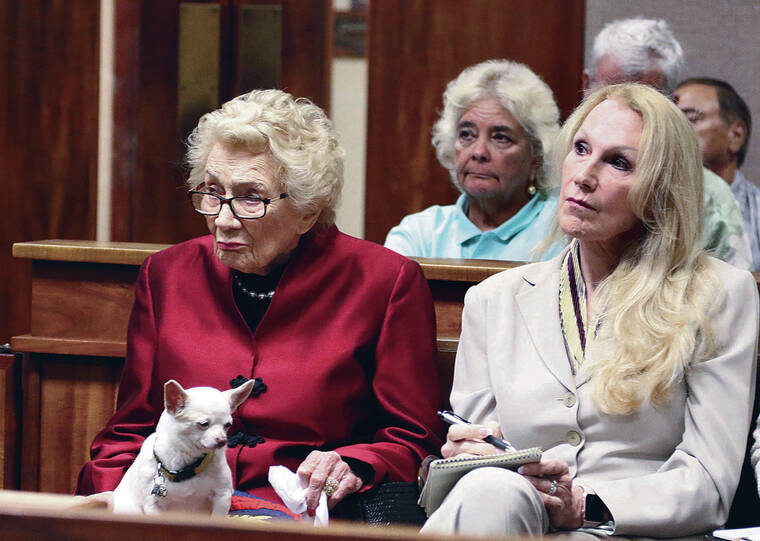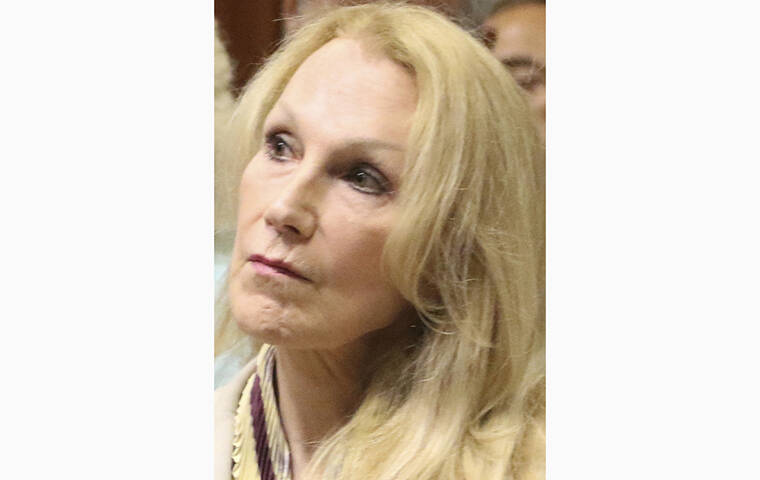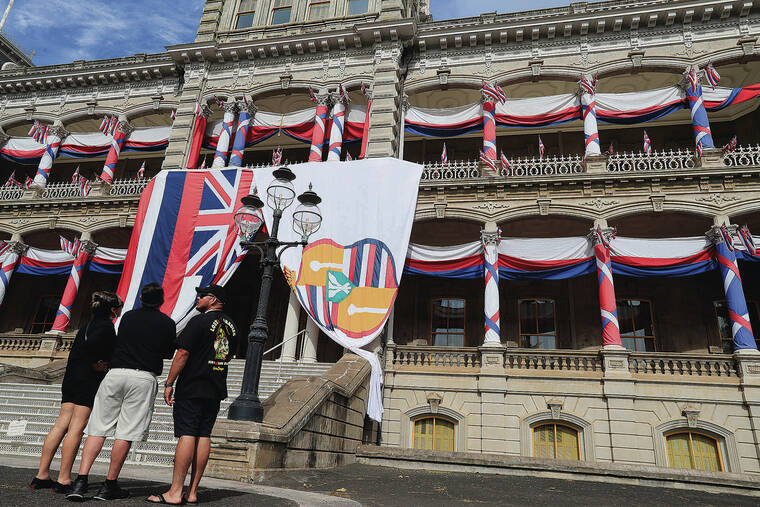The prolonged and contentious battle over the estate of the late Abigail Kawananakoa has come to an amicable end with the spouse of the late Campbell Estate heiress walking away with at least $40 million and the heiress’ foundation charity for Native Hawaiians expected to clear at least $100 million.
Iolani Palace, which Kawananakoa championed for many years before she died in December 2022, will receive artifacts and other historically significant items from the estate worth more than $200,000, according to the agreement.
The settlement was signed off on by Probate Judge R. Robert Browning last week and agreed to by all parties.
Roseanne Goo, Abigail K.K. Kawananakoa Foundation attorney, on Wednesday called the agreement “wonderful” and “awesome,” a gift to the Native Hawaiian people.
“It will impact and improve the lives of many children and families,” she said.
Kawananakoa, with an estate estimated at more than $200 million, inherited her wealth as the great-granddaughter of James Campbell, a 19th-century businessman from Ireland who made his fortune as a sugar plantation owner and one of Hawaii’s largest landowners.
Kawananakoa also was the great-grandniece of Queen Kapi‘olani and was a prominent, sometimes controversial figure in the islands, known for being a financial supporter of Native Hawaiian culture and causes, and an activist who frequently battled in court in her later years to fight for what she believed in.
Often referred to as
princess because of her royal heritage, Kawananakoa in 2001 created the
Abigail K.K. Kawananakoa Foundation, a charity to administer millions of dollars for Native Hawaiian causes after her death.
For now, the bulk of the estate will be retained by the Abigail K.K. Kawananakoa Living Trust, with distribution to the foundation after settlement of taxes and other obligations, a process expected to take up to a year and a half.
A plan for distribution of Kawananakoa’s personal effects, collections and artifacts was also negotiated in the settlement. Historically significant items will be delivered to Iolani Palace, while the foundation will receive culturally important items, and personal effects will be transferred to surviving spouse Veronica Gail Kawananakoa, 71.
The parties to the settlement issued a statement this week, saying “resolution of a complex estate within a year of her passing is a remarkable accomplishment.
“The Directors acknowledge Veronica’s goodwill and cooperation in this effort and are grateful to James Wright, trustee of Abigail’s trust, Robbie Alm, special administrator of Abigail’s estate, James Kawachika, the court-appointed master, and many others for their assistance as well.”
Asked for comment, Veronica Kawananakoa referred all questions to Wright, her former opponent in court, and Wright issued this statement: “I have only praise for Veronica Kawananakoa and her attorney R. Bruce Graham. They worked with my attorney Ian Nishi to craft a resolution that was fair and true to Abigail Kawananakoa’s intent.”
The tone is in stark
contrast to the fierce court battle that raged after Kawananakoa suffered a stroke in 2017.
Wright, Kawananakoa’s longtime attorney, asked the court for control of the estate as outlined in a successorship plan arranged by the heiress in case she became incapacitated.
But with her partner of 20 years at the time, Veronica Gail Worth, by her side, Kawananakoa insisted she was fine and fired Wright. She then married Worth, who took her last name.
A bitter court battle followed that revealed private details of the heiress’s life and unleashed accusations of abuse, manipulation and unethical behavior on both sides.
The court ended up blocking the couple from amending the trust and stopped an attempt to auction off 400 of the heiress’s personal belongings, including furniture, works of art, silverware and Polynesian artifacts.
In 2018 Browning ruled that Kawananakoa was not mentally capable of changing or revoking her trust
or of firing and replacing
its trustee. Two years later, Circuit Judge James Ashford ruled that Kawananakoa was mentally unfit to handle her own financial
affairs. Former Hawaiian Electric executive Robbie Alm was appointed as
conservator overseeing Kawananakoa’s personal
finances.
But the dispute continued even after Kawananakoa’s death in late 2022.
The settlement means the bulk of the estate — including her stock with the James Campbell Co. and various real estate holdings — will go to the foundation Kawananakoa set up in 2001.
According to its articles of incorporation, the nonprofit aims to “support,
preserve and foster the
traditional Hawaiian culture in existence prior to 1778 (European contact), including its art, language, music, religious practices and social history, while at the same time enabling Hawaiian people to function more effectively in the contemporary global community.
The money will be available not only to perpetuate Hawaiian culture, art, language and music as they existed prior to 1778, but to assist the descendants of the original islanders with the more mundane needs of life.
More specifically, the foundation will offer:
>> Scholarships, based on merit, to undergraduate and graduate students.
>> Provide medical treatment or offer financial support for nonelective medical needs of children and the elderly.
>> Assist folks with obtaining basic health insurance.
>> Provide services or
financial assistance for
unavoidable emergency financial needs.
>> Provide education and training for those with physical disabilities.
>> Help with services to those in need of legal counsel and advice.
The articles add that the money will not be used for anything having to do with Hawaiian sovereignty or other similar issues.
Goo said the foundation’s directors will likely use the next year or so to help determine precisely how it will distribute the money to the Native Hawaiian community.
Goo praised Hawaiians and non-Hawaiians alike
involved in the case for
“doing the right thing”
and preserving Kawananakoa’s legacy for the Native Hawaiian people.
“This was bigger than any one individual. It really was about the community,” she said, growing emotional. “There were so many points when it could have gone the wrong way. It feels like the ancestors were watching over the situation.”
Paula Akana, executive director of Iolani Palace, said she was pleased to hear that the Kawananakoa items were coming to the palace.
“They will help us tell the story of Hawaii’s alii,” she said. Some of the artifacts will be used in a new basement gallery exhibit scheduled to open in 2025.
Among the artifacts is a rare Hawaiian 19th century, or likely earlier, hand-hewn hardwood royal refuse bowl with human teeth, valued at $18,500.






